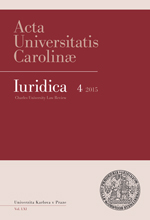Tradice mezinárodněprávní ochrany menšin a iniciativy „mateřských států“ menšin
The Tradition of the International Protection of National Minorities and Initiatives of Minorities’ “Mother States”
Author(s): René PetrášSubject(s): Law, Constitution, Jurisprudence
Published by: Univerzita Karlova v Praze, Nakladatelství Karolinum
Keywords: international protection of minorities; “mother state” of a national minority; Paris Peace Conference 1919–1920; the United Nations; theory and practice of international law
Summary/Abstract: Conflicts regarding national minorities are traditionally a considerable risk to the stability of states and even to world peace. The most dangerous situation occurs when the “mother state” of a respective minority interferes in the relationships between the state and said minority. In an effort to prevent such interventions, the enshrinement of minorities’ rights and of international supervision of the issue in international instruments was considered. The most extensive system (besides the current system of protection within the Council of Europe) was created at the Paris Peace Conference 1919–1920. It operated in the inter-war period, but it collapsed in the late 1930s, a time of poor political circumstances. The formal wording of minority treaties did not allow for the possibility of “mother states” to interfere in any way; however, the reality was different. Workers of the Minorities Section of the League of Nations always attempted to facilitate a compromise, i.e. to intermediate between the state and the “mother state” of the minority concerned.
Journal: Acta Universitatis Carolinae Iuridica
- Issue Year: 61/2015
- Issue No: 4
- Page Range: 149-159
- Page Count: 11
- Language: Czech

